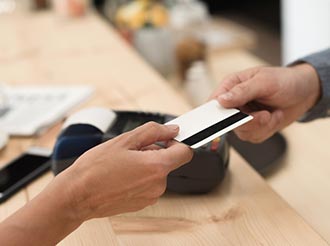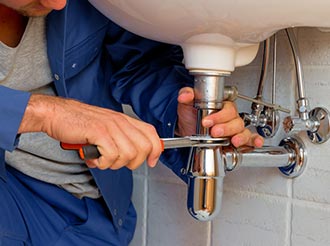If you live in Arlington Heights, IL, you know all about the harsh winters and need to be aware of the potential for frozen pipes. While frozen pipes aren’t particularly dangerous, the lack of running water once they’re frozen is inconvenient. Also, if it gets cold enough, the pipes can burst, which leads to a whole host of problems, not the least of which is a costly repair.
At S and J Plumbing, we’re experts not only at fixing broken and frozen pipes but also at making sure your pipes don’t freeze in the first place.
Let’s take a look at which pipes in your house are prone to freezing, what to look for during the cold months, and how to protect your home’s plumbing to ensure you get through the winter unscathed.
Contact us with any questions, or to set up an appointment for pipe repair or any of our additional services:
- Emergency Plumbing Services
- Water Heater Services
- Gas Line Services
- Drain Cleaning
- Clogged Toilet Repair
- And More!

Save on your frozen pipe repair when you access our coupons and deals!
Location, Location, Location — Frozen Pipe Prevention
So, how do you prevent frozen pipes? Along with having a professional plumber routinely come out to give your pipes a thorough inspection and tune-up, there are some proactive measures you can take to fortify your pipes against harsh climate conditions:
Insulate Before It's Too Late
The pipes most likely to freeze in your home are those that are exposed or located near the exterior walls or up in the attic. These pipes have no insulation and no protection against the cold. To guard these pipes from freezing and to avoid an expensive burst or frozen pipe repair service, consider investing in some pipe insulation. If you’re not sure which pipes are at risk, call our expert team to come out and make an assessment.
Seal Up to Prevent Cold Air from Seeping Through
Jack Frost can seep into your home through cracks in walls, floors, and around windows or doors. If cold air comes into contact with your pipes, it increases the likelihood that they will freeze. To avoid this, inspect your home for gaps and cracks where cold air can enter, and seal them with caulk or foam insulation. This helps maintain a more consistent indoor temperature, which, in turn, keeps your pipes warmer.
Keep Indoor Temps Consistent
Maintaining a consistent indoor temperature is another key way to prevent pipes from freezing. It's recommended to keep your home at a minimum temperature of 55°F (around 12°C), even if you’re leaving for an extended period. This temperature prevents the air inside your home from dropping to levels where pipes are more susceptible to freezing. Additionally, keeping your thermostat set to the same temperature day and night can reduce the likelihood of pipes freezing overnight when temperatures tend to drop the most.
Let Faucets Lightly Drip
While it might seem counterproductive, allowing your faucets to drip just slightly can help mitigate the risk of frozen water pipes. Standing water is more likely to freeze, and running water keeps things moving. You don't need to turn the faucet on fully — just a slow drip will do.
Open Cabinet Doors
If you have plumbing running through cabinets, such as under sinks in the kitchen or bathroom, leaving the cabinet doors open can help warm air from your home circulate around the pipes. This is particularly helpful for pipes located near exterior walls, where the temperature may be colder. Opening the doors helps prevent these pipes from becoming isolated in cold spots, reducing the chance of freezing.
Suspect Your Pipes Have Frozen Over? Look for These Signs
Spotting frozen pipes is relatively easy, but if you’re not sure, here are a few signs that your pipes are frozen or close to being frozen.
- Temperature: Naturally, once the temperature drops to freezing or below, your pipes are at risk.
- Water flow: If it’s cold outside, and you notice your faucet’s water flow slowing down, it might be a sign that your pipes are beginning to freeze. You can also see, in some instances, frost building up around your pipes.
- Odd smells: If you notice strange, foul odors coming from your faucets or drains, it may be a sign that there’s a blockage, which could point to a frozen pipe.
If you notice any of these signs, call our plumbing specialists immediately so we can assess the problem and suggest a course of action that can aid the thawing of your pipes and keep the water running freely.
Frozen vs. Burst Pipes: What's the Difference?
When temperatures drop, frozen or burst pipes become a common concern, particularly for outdoor pipes. Frozen pipes occur when water inside them solidifies, expanding as it freezes. The real danger lies in the excessive pressure this expansion creates within the pipe walls. When the ice obstructs the water’s flow, it causes a buildup of pressure that can lead to the pipe bursting. While freezing is a leading cause, burst pipes can also occur due to other factors like excessive pressure from blockages caused by debris, corrosion, or even improper installation.
Older plumbing systems, particularly those in outdoor pipes exposed to the elements, are more prone to these issues.
Pipes weakened by age or wear may struggle to handle fluctuating water flow, creating an even greater risk. Understanding the distinction between a frozen pipe, which can often be thawed before any damage occurs, and a burst pipe, which demands immediate repair, is key to avoiding costly water damage and extensive repairs.
What Our Frozen Pipe Repair Services Entail
When plumbers arrive to address frozen pipes, they approach the problem with precision and care.
The first step involves locating the affected section of the pipe and assessing the extent of the freeze. Specialized tools, like pipe thawing machines or heat lamps, are often used to gently warm the area, allowing the ice to melt without damaging the pipe itself. Once the water begins to flow again, plumbers inspect the line for any cracks or leaks that may have occurred during the freezing process. They’ll often recommend insulation or preventative measures to keep the problem from recurring, ensuring the pipes remain protected against future cold snaps.
By the time they’re done, you can feel confident that their plumbing is safe from further winter woes.
Act Quickly to Prevent a Broken Pipe — Call Now!
If you’ve determined that your house’s pipes are frozen, it’s vital that you act as quickly as possible to restore water flow and ensure those pipes don’t break. While you can always attempt to thaw the pipes yourself, it may be difficult depending on its location. It’s best to call in an experienced plumber, such as S and J Plumbing, to determine precisely where the problem is and how best to deal with it.
At S and J Plumbing, we know that you have plenty of options when it comes to finding a reliable, expert plumbing service, but before you call anyone else, check out what others are saying about us in ourreviews, and then let us take a look at your problem first. Contact us now and let us keep your pipes, and your family, safe and toasty.
FAQs About Frozen Pipe Repair
Is freezing only a risk for exposed pipes?
Freezing can pose a risk to both exposed and hidden pipes. While exposed pipes are more vulnerable due to direct contact with cold air, hidden pipes in unheated areas, such as basements, attics, or exterior walls, can also freeze when temperatures drop significantly. Proper insulation can help protect both types.
Is heat tape the most effective way to avoid frozen pipes?
Heat tape can be an effective solution for preventing frozen pipes, especially in areas prone to freezing temperatures. It provides consistent warmth along the length of the pipe, reducing the risk of freezing. However, other methods like proper insulation and maintaining a steady indoor temperature can offer additional protection, depending on the location and severity of the cold.
How long does professional frozen pipe repair take?
Professional frozen pipe repair typically takes a few hours, depending on the extent of the damage and accessibility of the pipes. Minor issues can be resolved quickly, while more complex repairs may require additional time for thawing and fixing any cracks or leaks.
Can S and J Plumbing help me with frozen or burst pipe repair?
Yes, our plumbers can help you with frozen or burst pipes. Our team is experienced in handling these emergencies to prevent further damage and restore your plumbing system efficiently.
Can strange noises be a sign of a frozen pipe?
Yes, strange noises like banging or whistling can indicate a frozen pipe. As water freezes, it expands, creating pressure within the pipe, which may cause these unusual sounds.




